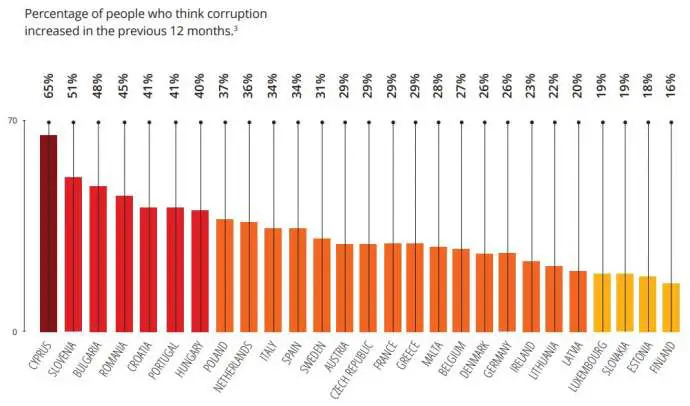STA, 15 June 2021 - More than half of Slovenian respondents believe that corruption increased in Slovenia last year, shows Global Corruption Barometer for the EU 2021, a survey released by Transparency International (TI). Responses by Slovenian participants suggest the second worst deterioration of the situation in the EU.
Almost a third of European citizens think that 2020 saw a rise in corruption. Meanwhile, only respondents from Cyprus gave a worse assessment of the situation than those in Slovenia as 65% of them think that corruption flourished during the pandemic year of 2020. In Slovenia, the relevant rate is 51%.
Almost two-thirds (66%) of the Slovenian respondents said that citizens feared retaliatory measures upon reporting instances of corruption, which is the third highest rate in this category in the EU, behind Cyprus (76%) and Croatia (72%). This is cause for concern, said the head of TI Slovenija Alma Sedlar.
Almost 84% of the respondents in Slovenia said that corruption within the government was a big or a very big problem. What stands out is an increase in those who think that the Slovenian prime minister or members of his office are involved in corruptive practices (38.6%).
On a positive note, the share of those who believe that citizens could contribute to the fight against corruption has significantly increased, to 66.1%.
For the first time since the start of such polling, the survey focused on various types of personal experience of corruption. In Slovenia, 18% used personal connections to gain access to public services in 2020, the second lowest rate in the survey, which compares to the EU average of 33%. 4.1% of the Slovenian respondents bribed their way to public services.
Sedlar warned that even though Slovenia was a country where bribery was a rare occurrence, the increase in this category did not bode well for the situation, noting that the amount of those with experience of bribery in healthcare more than doubled to 4.6% compared to 2016.
Some 6% of the Slovenian respondents said that they or their acquaintances were asked to do sexual favours in exchange for access to some public services in the past five years, which is slightly below the EU average of 7%.
TI Slovenija pointed out in a press release that "it seems that there is no discussion on reforms to ensure a more effective prevention of corruption in Slovenia". The NGO said that its appeals to provide a more effective protection of whistleblowers, step up efforts to ensure transparency and come up with preventive measures in relation to the recovery plan had been ignored.
The survey was conducted between October and December 2020 among more than 40,000 adults across the EU. In Slovenia, the survey was carried out between 13 October and 19 November 2020 among 1,003 respondents.







